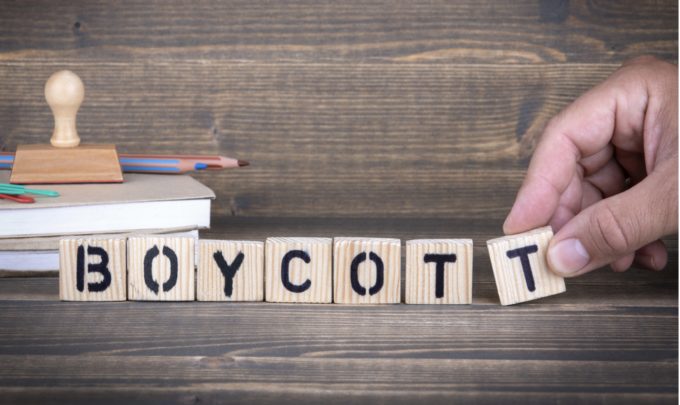
Eighth Circuit: State Law Forbidding Government Contractors from Boycotting Israel is Unconstitutional
By Amre Metwally — Edited by Aris Hadjipanteli
Arkansas Times LP v. Waldrip, No. 19-1378 (8th Cir. Feb. 12, 2021), opinion hosted by USCourts.gov.
Anti-boycott laws are nothing new in the United States—roughly 27 states have already enacted restrictions that seek to minimize activities that boycott Israel. The content of the legislation varies by state, though the measures can include requiring government contractors to “certify” that they will not boycott Israel. Though no anti-boycott law exists at the federal level, the House and Senate chambers of Congress have introduced their own bills that would criticize boycotts of Israel. These pieces of legislation particularly aim to suppress efforts to boycott Israel through the global “Boycott, Divestment and Sanctions Movement” (BDS). The BDS movement seeks for institutions to boycott, divest from, and sanction Israel until Israel ends its occupation of the West Bank. This movement has generated immense controversy, with supporters insisting that BDS is not anti-Semitic (and that the movement expressly rejects anti-Semitism) and detractors claiming otherwise.
In February 2021, the Eight Circuit issued an opinion after the Arkansas Times (the Times), the plaintiff-appellant, appealed the decision of a federal district court in Arkansas. The US District Court for the Eastern District of Arkansas heard the case involving Act 710, a statute that forbids state parties from establishing contractual agreements with companies that boycott Israel. The Times brought the suit after it refused to sign a certification, as part of an advertising deal, that it would not boycott Israel. The University of Arkansas Board of Trustees required the certification under the Act. The Times relied heavily on N.A.A.C.P. v. Claiborne Hardware Co., a Supreme Court case that held that states cannot prohibit political boycotts. That case was brought by white merchants seeking to enjoin Black Mississipians’ calls to boycott white-owned businesses.
The District Court held that Act 710 was constitutional on First Amendment grounds because a boycott “is neither speech nor inherently expressive conduct.” This idea that boycotts are not speech is supported by a number of scholars including UCLA Professor Eugene Volokh and Cornell Professor Michael Dorf. Proponents of this point of view ultimately stress several arguments. One is that economic activity is not speech and should not be treated as such. A second is that boycott laws are essentially similar to public accommodations laws that forbid discrimination. Even further, they believe that finding boycotts to be inherently expressive, and thus protected under the First Amendment, risks rendering unconstitutional laws that prevent sellers from refusing service to customers on the basis of discriminatory views.
Other scholars who do not agree with those views, such as University of Pennsylvania Professor Amanda Shanor, stress that while public accommodations laws regulate “routine economic behavior,” these anti-BDS laws are aimed particularly at halting political boycotts and are thus First Amendment violations.
The Eighth Circuit finds that the language of Act 710 seeks to both compel a contractor not to “engage in economic refusals to deal with Israel” and simultaneously curb said contractor’s promotion of boycotts of Israel. The Court ultimately concludes that supporting boycotts of Israel is protected under the Constitution and that Act 710 violates First Amendment rights. The dissent, on the other hand, argued for reading the Act as narrowly circumscribing commercial conduct only, to avoid interpreting it as unconstitutional. Other federal courts have also found that these anti-BDS laws are unconstitutional, such as a court in Texas that struck down a law similar to the one at issue in Arkansas Times. While some have celebrated the recent court decisions, others have been equally vocal in their opposition. What is clear, however, is that the Eighth Circuit case surely won’t be the last battle on this topic.